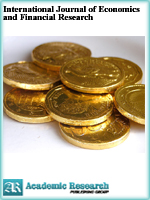International Journal of Economics and Financial Research
Online ISSN: 2411-9407
Print ISSN: 2413-8533
Print ISSN: 2413-8533
Quarterly Published (4 Issues Per Year)

Archives
Volume 7 Number 1 March 2021
The Effects of the Audit Committee Independence and Expertise on Firms' Value, an Empirical Study on Palestine Empirical Study on Palestine
Authors: Mohammed Azam ; Man Wang
Pages: 14-20
DOI: doi.org/10.32861/ijefr.71.14.20
Abstract
This study examined the influence of the characteristics of the audit committee on Palestinian firms’ value. The research explores precisely the effect on the Audit Committee characteristics’ efficiency, namely, independence, expertise, evaluating the relationship among dependent and independent variables. Secondary data collected from a list of companies were registered in the Palestine Stock Exchange from 2011 to 2018. Individual variables considered are the independence & expertise of the audit committee, whereas the ROA is employed as the dependent variable as an indicator of a firm’s value. The results showed that the Audit Committee’s independence & expertise substantially positive with ROA. The study concluded that the audit committee’s characteristics are enhancing firm performance. The implications of this study’s findings can be used by decisions and policymakers, the firm’s management, and other stockholders’ interests to create reliable ties between agents and the principals.
Emotional Intelligence and its Impact on Effective Human Resource Management
Authors: John Nkeobuna Nnah Ugoani
Pages: 5-13
DOI: doi.org/10.32861/ijefr.71.5.13
Abstract
There is increasing acceptability of emotional intelligence as a major factor in personality assessment and effective human resource management. Emotional intelligence as the ability to build capacity, empathize, co-operate, motivate and develop others cannot be divorced from both effective performance and human resource management systems. The human person is crucial in defining organizational leadership and fortunes in terms of challenges and opportunities and walking across both multinational and bilateral relationships. The growing complexity of the business world requires a great deal of self-confidence, integrity, communication, conflict, and diversity management to keep the global enterprise within the paths of productivity and sustainability. Using the exploratory research design and 255 participants the result of this original study indicates a strong positive correlation between emotional intelligence and effective human resource management. The paper offers suggestions on further studies between emotional intelligence and human capital development and recommends conflict management as an integral part of effective human resource management.
Loan Characteristics as Predictors of Default in Commercial Mortgage Portfolios
Authors: Nicole Lux ; Sotiris Tsolacos
Pages: 1-4
DOI: doi.org/10.32861/ijefr.71.1.4
Abstract
This paper examines the role of loan characteristics in mortgage default probability for different mortgage lenders in the UK. The accuracy of default prediction is tested with two statistical methods, a probit model and linear discriminant analysis, using a unique dataset of defaulted commercial loan portfolios provided by sixty-six financial institutions. Both models establish that the attributes of the underlying real estate asset and the lender are significant factors in determining default probability for commercial mortgages. In addition to traditional risk factors such as loan-to-value and debt servicing coverage ratio lenders and regulators should consider loan characteristics to assess more accurately probabilities of default.



